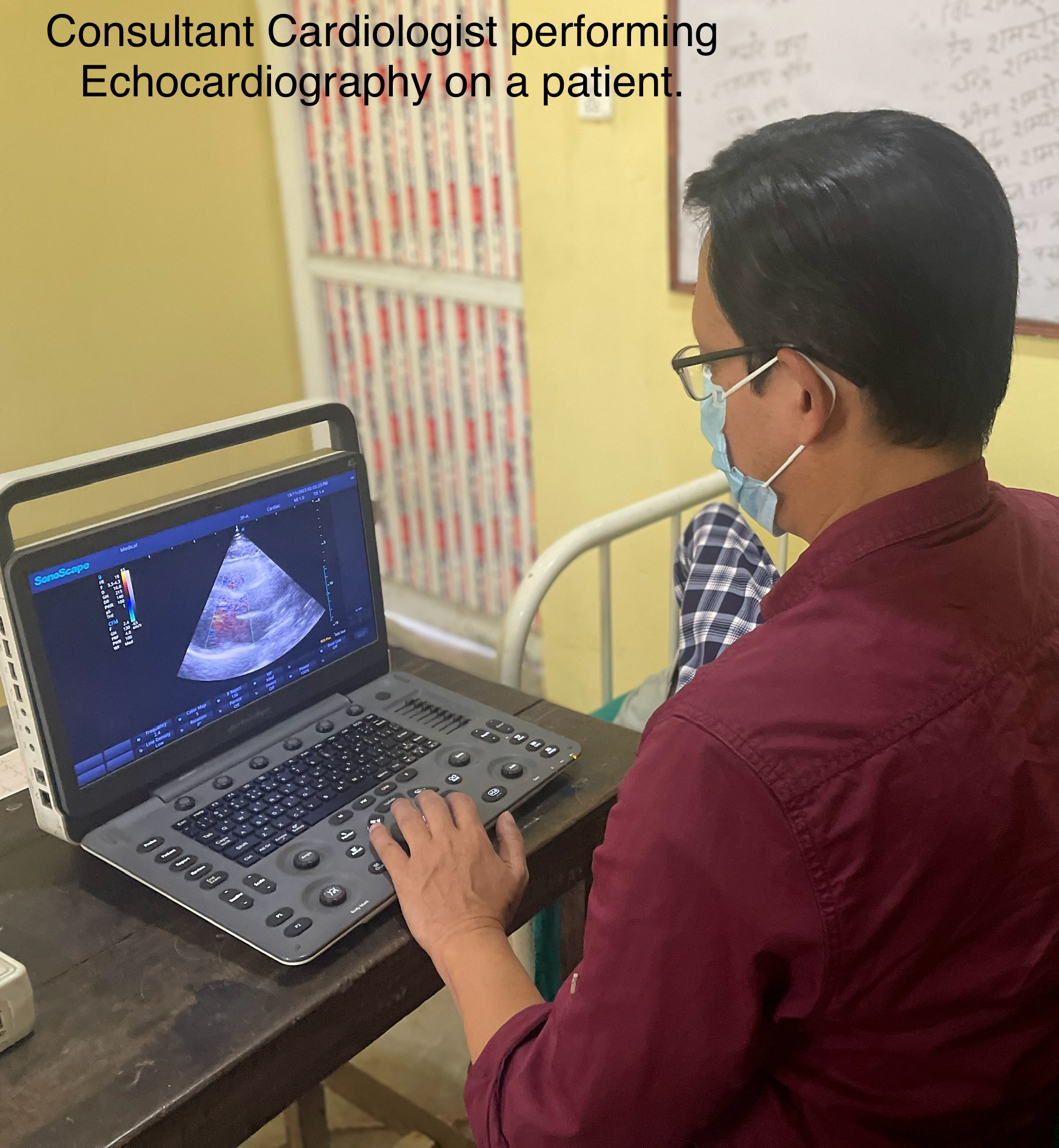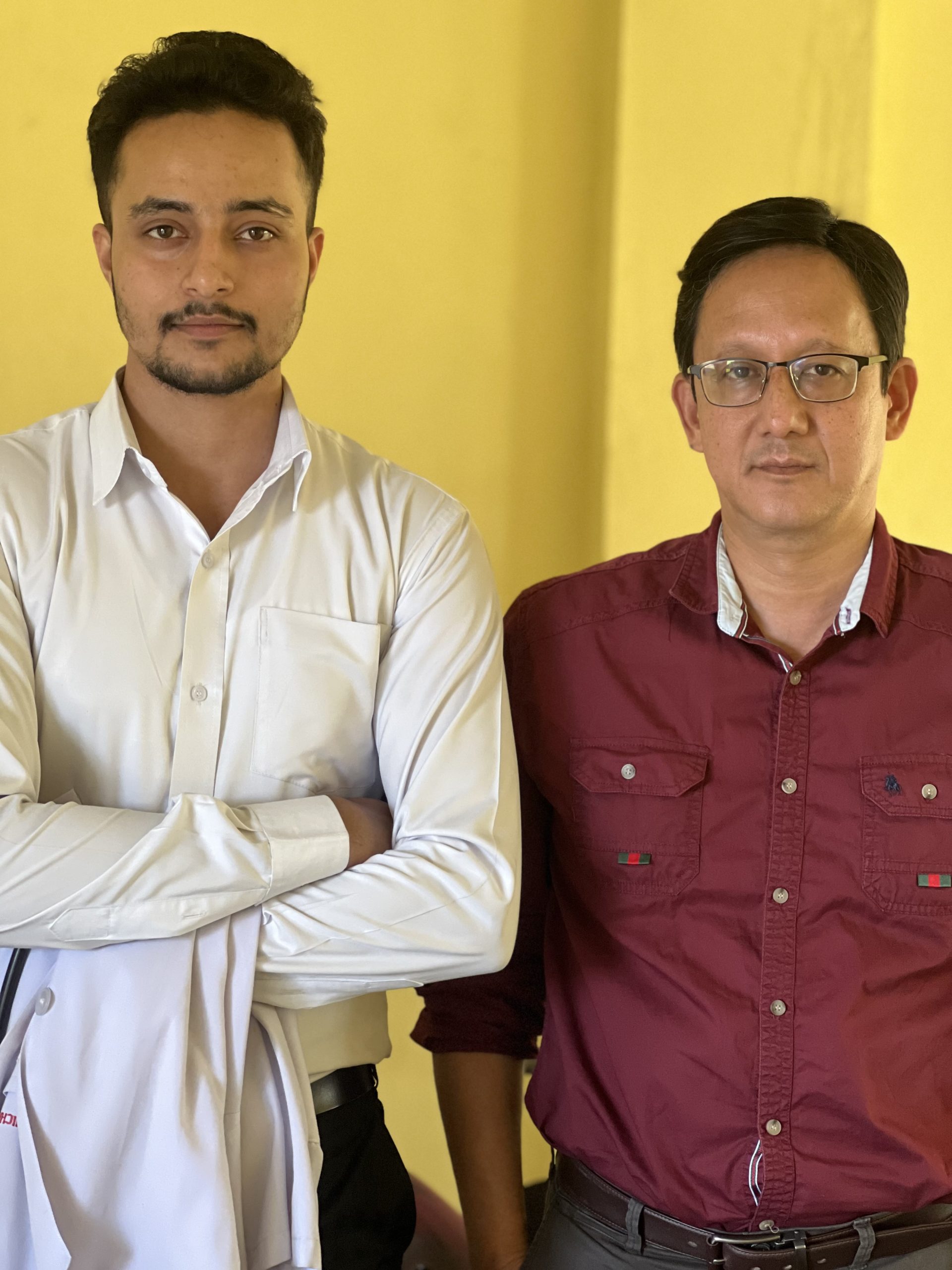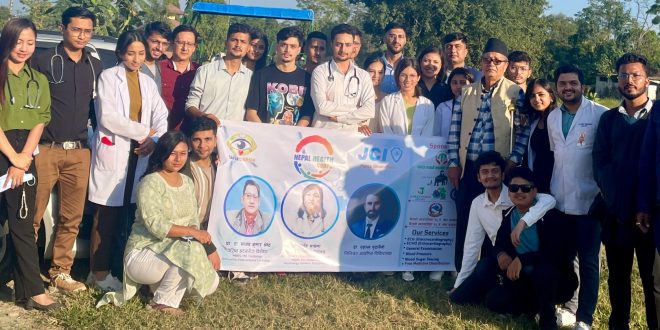Words by Aayush Lamichhane
Bringing screenings to rural Nepal, these initiatives offer a beacon of health for those often overlooked by mainstream healthcare.
Most of us are aware that long-term diabetic patients have difficulty healing their wounds, particularly on the foot, which can lead to serious consequences such as “Diabetic Foot.” This is linked to peripheral neuropathy, which patients develop gradually as a result of uncontrolled blood sugar levels. However, there is another issue associated with the same pathophysiology known as “Silent Myocardial Infarction” or simply “Silent Heart Attack.” In such cases, there is no acute chest discomfort, and if it is not a major heart attack, patients usually survive, but their day-to-day activities are considerably limited owing to a weak heart, and the clock is always ticking for their lives if it is not diagnosed in time and there hasn’t been any significant intervention. Similar circumstances applied to Mr. BK, a 62-year-old former security guard from Chitwan who had long history of diabetes for 18 years. A team of doctors on a camp equipped with ECG and ECHO facilities, found “noticeable Q-wave” on his ECG and “Akinetic Regional wall motion abnormalities” on his ECHO. This discovery allowed the health camp team to take immediate action, informing him and assisting him in receiving the timely necessary care for his treatment in a more advanced cardiac facility, saving a life. It was a team led by Prof. Dr. Sanjaya Kumar Shrestha, a cardiologist and Aayush Lamichhane, a final year medical student at KMC who led the team of medical officers and medical students organizing a cardio-focused camp under “PROJECT MUTU” in Chitwan.

This case study merely serves as an example from this health camp. Another instance with a comparable presentation and diagnosis existed. Two cases of “Valvular Heart Disease,” both most likely with a rheumatic etiology, and three cases of “Dilated Cardiomyopathy” were also detected with ECHO in the camp. Using an ECG, a case of “Bifascicular bundle branch block” was also identified. Nine of the thirty-two patients with “undiagnosed hypertension” of various grades had “concentric left ventricular hypertrophy,” which was again detected using the ECHO. Thanks to Medrik Pharmaceutical Private Limited, all of these hypertension patients received free medication at the campsite. The rest of the cases were referred to higher health centers because it was not possible to treat those cases in the camp itself.
Initiatives like Project Mutu become lifelines for those unseen by mainstream healthcare. They bring vital screenings and services to the marginalized, dismantling barriers to access.
In addition to cardiac investigations, the camp offered diabetic screening through an investigation of “Fasting and Postprandial Blood Glucose Level,” which led to the discovery of eight cases of “Undiagnosed Diabetes.” These patients were then started on anti-diabetic medications at the camp site with appropriate counseling.
 Additionally, Assoc. Prof. Dr. Smriti Mathema oversaw the camp’s pediatric department. Services like “Anthropometry,” “Immunization consultation,” “Breastfeeding consultation,” “Nutritional consultation,” “Developmental analysis,” and, finally, “One-on-one Consultation” with Dr. Smriti were available in this section. Five cases of acute suppurative otitis media (ASOM) and seven cases of upper respiratory tract infections (URTIs) were diagnosed and medication was provided at the campsite. Two suspected cases of asthma were found, counseled and referred. A case of “psoriasis” was identified, and the patient was given advice and directed to a dermatologist. One case of autism was identified, given counseling, and directed to a developmental pediatrician. A “Cavernous Hemangioma” patient was discovered and referred to the surgery department, which was housed in the camp alongside Senior Surgical Resident Dr. Prashant Pudasaini of KMC.
Additionally, Assoc. Prof. Dr. Smriti Mathema oversaw the camp’s pediatric department. Services like “Anthropometry,” “Immunization consultation,” “Breastfeeding consultation,” “Nutritional consultation,” “Developmental analysis,” and, finally, “One-on-one Consultation” with Dr. Smriti were available in this section. Five cases of acute suppurative otitis media (ASOM) and seven cases of upper respiratory tract infections (URTIs) were diagnosed and medication was provided at the campsite. Two suspected cases of asthma were found, counseled and referred. A case of “psoriasis” was identified, and the patient was given advice and directed to a dermatologist. One case of autism was identified, given counseling, and directed to a developmental pediatrician. A “Cavernous Hemangioma” patient was discovered and referred to the surgery department, which was housed in the camp alongside Senior Surgical Resident Dr. Prashant Pudasaini of KMC.
A record number of service seekers showed up on November 18, 2023, hoping to get something from the camp. Out of those, 170 patients were selected for further investigations and consultation by medical officers, internists, and students. The narrative of this camp began on October 30, 2022, when the founder of “PROJECT MUTU”, Aayush Lamichhane conducted his first health camp in Korak, Chitwan with the help of very few resources that he gathered from friends and family. A general health test, a diabetes screening, and a hypertension screening were given to 120 patients. Notwithstanding its modest beginnings, the challenge of managing a health camp with little fund and a team consisting of just two medical officers, three medical students, two nurses, and other non-medical volunteers attracted the attention of Founder’s School teacher Ramesh Parajuli, who offered him a new opportunity or challenge: “Plan a mega health camp without financial restrictions”. For him, the objective was obvious: put together a stellar medical team and carry out a program that really could change lives. He was introduced by Ramesh Sir to Mr. Ganesh Kumar Shrestha, the President of Kumroj Community Forest, whose organization went on to become the main donor to the camp in November 2023.

It’s also fascinating why “Project MUTU” was founded. A 78-year-old man from Chitwan, Khairahani, who was the founder’s neighbor, passed away at 11 p.m. in July, 2023. When he inquired about the death, he learned that the patient had been complaining about severe epigastric pain at around 7 p.m. for which he was taken to the nearby polyclinic. There, he received intravenous Pantoprazole and an ECG as part of routine procedure, the patient was then sent home with the advice to rest and avoid spicy and oily foods. However, the patient’s anguish persisted, and a few hours later, he passed away. After learning about this, the founder requested to see the patient’s ECG. The results showed “ST segment elevation” on leads II, III, and aVF, indicating a “inferior wall ST-segment elevation myocardial infarction” with a typical presentation. This realization brought to the founder’s attention the amount of work that remains in the field of heart health, particularly in Nepal’s peripheral areas, even with the installation of highly modern cardiac centers in the nation’s capital, Kathmandu.
Through early detection and intervention, projects like Project Mutu save lives and enrich communities, creating ripples of impact that extend far beyond initial screenings.
This planted the seed for “Project MUTU” in the field of community-based healthcare initiatives, where its vision has grown into an inspiring story of influence, resiliency, and volunteerism. The founder is now an ambassador for Nepal Health Corps, a nonprofit organization that works to provide “Health for All,” particularly in low- and middle-income nations. Because they introduced the creator to other significant investors like “Sapana Village Social Impact” and “Jungle World Resort,” the journey became easier and more genuine as a result.
Speaking more broadly, the goal of “Project MUTU” is to conduct further health camps with a cardiac focus camps in rural Nepal in order to achieve a comparable impact to that of the camp of Chitwan in november 2023.
The NHC KMC team led by Aayush and including Dr. Sanjaya will have completed the second program under “Project MUTU” in Bungamati, Lalitpur on December 23, 2023, by the time you read this story. This is an example of secondary-level prevention in the context of heart health in Nepal. It focuses on early detection of heart problems in individuals, even before they seek treatment at a higher level of healthcare facilities. When possible, interventions are made at the camp itself; if not, referrals to heart centers are made.
Initiatives like Project Mutu stand as beacons of hope, illuminating the path towards a healthier future for communities that often remain unseen by mainstream medical services. Such projects become lifelines for individuals who might otherwise never have the opportunity for early disease detection or preventative care. By venturing into rural areas and remote communities, these initiatives bring vital screenings and healthcare services to the doorsteps of those marginalized by geographic isolation or limited resources. They dismantle barriers to access, enabling the identification of diseases and conditions that might have otherwise gone unnoticed. The ripple effects of these interventions are immeasurable. Through early detection and timely interventions, lives are not just saved but also enriched.
Feel free to get in touch with the founder alamichhane142@gmail.com if you would wish to be part of the project or to contribute to our mission in any way, whether it be through funding, people, ideas, or something else entirely. Together, let us work for “Project Mutu” to serve the unserved.
 Medicosnext
Medicosnext




